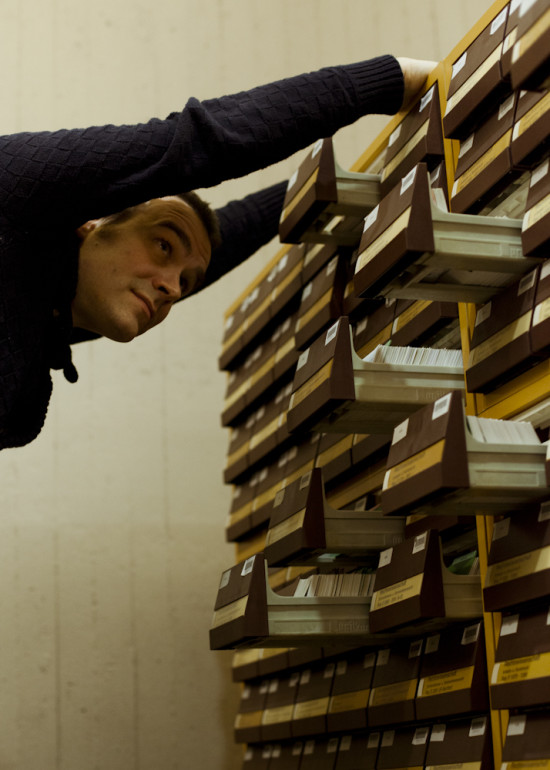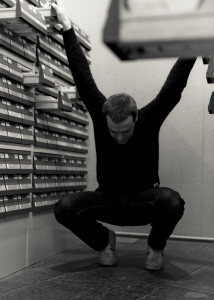I discovered Freddy Knop aka pOnk way back in 2011, but it took me over a year to finally grab him for an interview. Shame on me since he’s making really interesting and intricate musical compositions. Basically the man captures ambient recordings, sounds most of us don’t pay attention to, and places them on a bed of sounds more commonly associated with music, for example, guitar, keyboards, various beats, percussion, electronics and whatever other instruments, sound issuing objects and sound modifiers are lying around. He finds patterns and melodies in a world of chaos and introduces us to soundscapes we can easily dive into.
Currently he’s working on a project that’s based on harvesting the sounds made by different objects in his childhood apartment. He should be done before the year is over and something tells me that anyone who’ll have a listen will never look at their toaster in the same manner. Lucky for us pOnk is planning to sweeten the anticipation with a new EP. Watch out for the release within the upcoming months.
I met him in the Staatsbibliothek, as Freddy is busy working on his PHD.
What fascinates you about sound?
FK: Hmm. Well I guess… right now I’m pretty fascinated with field recordings and recording things that have a personal meaning to me. (It’s) just like walking around with a digital camera and catching impressions. I feel that I do the same with recording sound. Everything I use – most of the samples I use – they don’t come from pre-produced presets or CD-Roms. They mean something to me, like, for example if I’m looking for a bass drum I might just take a specific book from the shelf and hit it against the wall, then it becomes something kind of private, it turns into a memory.
Do you have anything against sampling other artists?
FK: Not at all. (…) I have quite a background in listening to hip-hop music, sampling culture means a lot to me. I’m still fascinated by that. It’s just that I prefer to be responsible for everything I use in my music.
How did it start for you – using the objects around you to make sounds? How did you discover that?
FK: Hmm… I guess, firstly because I’m always looking for conceptual approaches to music I always try to come up with a set of rules that I’m trying to follow. One major project that I’ve been working on for a while now has been to record the apartment that I grew up in. I record everything that’s in the apartment – like the furniture, the windows, the stuff you use in the kitchen – to create this huge data bank of samples and then organize them in something like a drum machine. That makes you sort of able to play the apartment with your fingers. This concept made me really curious about how far I can take this approach.
A second part of the answer would be that I work as a music researcher with a focus in 20th century music. I always found it extremely fascinating how important the broadcast became for musical culture after the second world war II. There was all this experimentation with tape and everyday life sounds, something I always found extremely interesting.
Is there any sound that is horrible?
FK: Let me think – I have to be really careful now – well whenever I hear a sound I don’t like, for example, I’m not the biggest fan of saxophones (…) 80’s pop and rock music kind of ruined the instrument for me and I just can’t listen to the sound, without hearing, like, this really bad 80’s music. Especially over here in Germany everybody still listens to the 80’s – in a cab or if you’re in an elevator or in a hotel – there will always be this cheesy 80’s stuff like the Dirty Dancing soundtrack, for example. But if I hear a saxophone I would probably already have five different ideas in my head for what kind of procedures I would apply to it in the studio to make it sound like something I like.
In your work process – how important is improvisation?
FK: I improvise more at the stage of recording. It’s very important. Like, if I’m sitting in front of a… I don’t know, if I’m sitting in front of a piano and I’m recording the inside of it, then I would improvise in a way that I would probably try out like 10 or 20 different angles of the microphones and see what I like best and then decide on one or two different versions. Once everything is in the computer the process becomes very constructivist, with lots of love for details. Kind of like a traditional way of composing where I cut, loop, paste, shift, handle hundreds of sounds in one big audio session.I don’t not use a lot of midi and effects. My stuff is usually very clean and detailed.
You don’t really play that much.
FK: I’m playing a lot more with my band. I have this kind of mathy post-rock band called mOck. We play and tour a lot and release more music than I do as a solo artist. The solo project is probably 80% a nerdy studio project and only 20% is performing. Although I love to perform I’m not so behind it trying to play everywhere.
Majority of the labels that you do co-operate with – Mush Records and Circle Into Square, for example – are US-based. Why is that actually?
FK: It’s probably also a little bit my „fault“, or my pleasure, because I listen to a lot of music that happens in the US. I have a lot of friends there and people who are interested in my music and whose music I’m very interested in as well. There are smaller indie labels, that are very open to things like that, more than there are here, I think.
Let’s pretend that you could can choose only three objects that you could make sounds out of which ones would you choose?
FK: Well I just made a remix for my friend Cars&Trains – I met him last year in Berlin – and he once mentioned to me that he really liked this book ‘Berlin Alexanderplatz” by Alfred Döblin and I just kept that in mind. For the remix I used this book to create all the drum sounds. I found an extremely wide variety of sounds that I used to create a really complex set of different sounding percussive sounds. So right now I would probably say I would really keep a big book and some bell like instrument, because I love bells, celesta and these kind of instruments and maybe a double bass.
But wait that’s an instrument! You have to pick something that’s not an instrument.
FK: Then maybe, let me quickly think, it’s not so easy.
No don’t worry it’s not like a test or anything.
FK: I don’t know maybe a toaster. I’m not sure. [laughs]
Your music creates a certain atmosphere a soundscape and I was wondering if you would like to work on movie soundtracks? Is that something you’d be interested in doing?
FK: Until now I have only made tunes for little internet series and for my old friend Timo Pritzel. He is a mountain bike professional and he always asks me for beats. I love to sometimes keep it simple and just make some sort of a hip-hop beat or something, but other than that I would absolutely love to (…) be involved in more film music projects.
So far you’ve released EP’s have you ever considered maybe doing a full length album?
FK: Yeah. I mean actually, this apartment thing will definitely turn into a full length album. To me there is not such a categorical difference between an EP and an LP. It’s just two words that roughly mean either less than 20 minutes or more than 20 minutes and all of a sudden it turns into an LP. I don’t really care. I can release a piece that is 12 minutes (long), like one stream of music in only one track, and sometimes, like with the next EP, I will have, I think, 7 tracks about 22 minutes long and it’s always, you know, it really only matters what the project is kind of asking for. It doesn’t really matter so much to me if you call it an LP or an EP. I know it matters to a lot of people and if you put it on iTunes or if you press it on vinyl it will have to be called an album or something else.
I read somewhere that you really wanted to be prepared before you started playing live. How is it going for you now, playing live? What are the challenges?
FK: The big challenge is to make it look interesting and not entirely boring because if you’re alone on stage, there’s always a danger of using too much playback. That’s why I chose to work with an Akai MPD which is a MIDI controller that has, like, these rubber pads on them that I can play. I use these buttons to trigger samples so I really have to „play“. If I’m not using my hands like that the whole thing just sounds, you know, not like the real thing. I’m always trying to put myself under a lot of pressure so that I really perform and not just sit there with the laptop.
One of my main, most important things, when I prepared the live set was to set it in a way so that I could just put the laptop on the floor and probably leave it open a little bit, just to see if everything works well, but not have it really close to my eyes. It’s a compromise but it seems to work. I like to perform on my own. (…) It’s very convenient sometimes to be able to just confirm a gig and don’t have to ask, like, four different musicians. I think I found a compromise that works for me.
The nearest opportunity to see pOnk play live will be at ://about blank supporting The Chap on Feb 19th.






